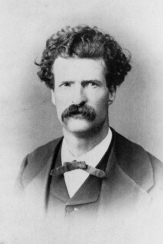Professional Comparison/Contrast Essay
Mark Twain
Two Ways of Seeing a River

Born Samuel Langhorne Clemens, Mark Twain (1835–
Twain, a native of Missouri, discovered his love for writing while working as a typesetter and editorial assistant at a local newspaper. Later, he took a job as a river pilot’s apprentice. Among the many books Twain was to publish in the following years were Tom Sawyer (1876), Huckleberry Finn (1884), and Life on the Mississippi (1883), from which the following excerpt was taken.
In this essay, Twain paints a vivid picture of the Mississippi River and describes an upsetting change to this picture that occurred during his time as a pilot’s apprentice.
Vocabulary development
mastered: had become skilled in
trifling: small; of little importance
majestic: great; dignified
hue: color; tint
solitary: single
conspicuous: clearly visible
opal: a gemstone that, typically, is made up of many colors
ruddy: rosy
radiating: extending outward
somber: sad
bough: limb
unobstructed splendor: unblocked (view of) beauty
marvels: wonderful things
bewitched: under a spell; fascinated
rapture: joy; ecstasy
wrought: caused to appear
bluff reef: a type of sandbar that is difficult to see and, therefore, dangerous to boats
yonder: in the distance
shoaling up: becoming shallow
snag: a tree or tree part in the water; it can damage boats
compassing: enabling; providing direction for
break: a wave (in this case)
unwholesome: unhealthy
1
Now when I had mastered the language of this water and had come to know every trifling feature that bordered the great river as familiarly as I knew the letters of the alphabet, I had made a valuable acquisition. But I had lost something, too. I had lost something which could never be restored to me while I lived. All the grace, the beauty, the poetry, had gone out of the majestic river! I still kept in mind a certain wonderful sunset which I witnessed when steamboating was new to me. A broad expanse of the river was turned to blood; in the middle distance the red hue brightened into gold, through which a solitary log came floating, black and conspicuous; in one place a long, slanting mark lay sparkling upon the water; in another the surface was broken by boiling, tumbling rings that were as many-
2
I stood like one bewitched. I drank it in, in a speechless rapture. The world was new to me and I had never seen anything like this at home. But as I have said, a day came when I began to cease from noting the glories and the charms which the moon and the sun and the twilight wrought upon the river’s face; another day came when I ceased altogether to note them. Then, if that sunset scene had been repeated, I should have looked upon it without rapture and should have commented upon it inwardly after this fashion: “This sun means that we are going to have wind tomorrow; that floating log means that the river is rising, small thanks to it; that slanting mark on the water refers to a bluff reef which is going to kill somebody’s steamboat one of these nights, if it keeps on stretching out like that; those tumbling ‘boils’ show a dissolving bar and a changing channel there; the lines and circles in the slick water over yonder are a warning that that troublesome place is shoaling up dangerously; that silver streak in the shadow of the forest is the ‘break’ from a new snag and he has located himself in the very best place he could have found to fish for steamboats; that tall dead tree, with a single living branch, is not going to last long, and then how is a body ever going to get through this blind place at night without the friendly old landmark?”
3
No, the romance and beauty were all gone from the river. All the value any feature of it had for me now was the amount of usefulness it could furnish toward compassing the safe piloting of a steamboat. Since those days, I have pitied doctors from my heart. What does the lovely flush in a beauty’s cheek mean to a doctor but a “break” that ripples above some deadly disease? Are not all her visible charms sown thick with what are to him the signs and symbols of hidden decay? Does he ever see her beauty at all, or doesn’t he simply view her professionally and comment upon her unwholesome condition all to himself? And doesn’t he sometimes wonder whether he has gained most or lost most by learning his trade?
Question
What is the thesis statement?
Question
What type of organization does this essay use (point by point or whole to whole)?
Question
Why do you suppose Twain’s perceptions of the river changed?
Question
How is the writing in the “before” and “after” sections of the essay similar? How is it different?